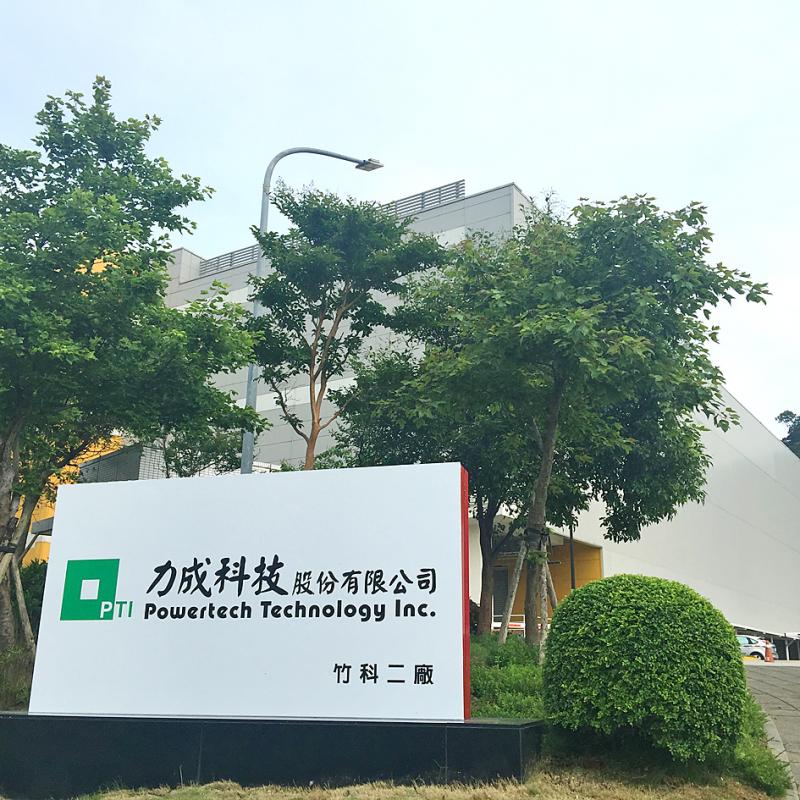Memorychip packaging and testing service provider Powertech Technology Inc (力成科技) plans to invest more than NT$20 billion (US$719.17 million) to build a second production facility at the Hsinchu Science Park (新竹科學園區) as part of the government’s Invest in Taiwan initiative, the Ministry of Economic Affairs said yesterday.
Powertech was prompted to “reshore,” or shift its manufacturing facilities from China back to Taiwan, by a US-China trade dispute, InvesTaiwan Service Center interim spokeswoman Nicole Chen (陳明珠) said.
“We have been working with them since 2019 to come up with a plan that will allow them to be included in the initiative,” Chen said.

Photo: Grace Hung, Taipei Times
The initiative rewards projects with favorable financing terms, with the government footing the bill for some bank fees, she said.
The government also helps companies find sites and labor, although this was not required by Powertech, she said.
In return, the firm has to show that the investment will be in high-value “smart” manufacturing and create jobs that pay well, she said.
More than 2,000 jobs will be created by this investment, the ministry said in a release.
“It is not easy to hire workers in Taiwan,” Chen said. “We only want to create quality jobs that create a lot of value.”
In addition to its second manufacturing location in Hsinchu, Powertech is to upgrade its four existing production facilities in Taiwan with the funds.
Seven other companies were approved by the Invest in Taiwan committee, but unlike Powertech, they were small or medium-sized firms — having a market cap of less than NT$2 billion and generally fewer than 200 employees.
They have to meet the same criteria for smart manufacturing, Chen said.
“It does not matter whether you are making semiconductors or noodles,” she said.
A-Sha Foods Enterprise (阿舍食品企業), a maker of premium packaged ramen noodles, is to invest NT$700 million in a new Tainan facility using AI to monitor production, Chen said, adding that 115 jobs would be created.
Companies in the initiative have to outline requirements for resources such as water and electricity, Chen said in response to questions over whether the reshoring program would add to the stress on utilities in Taiwan amid power outages and a water shortage.
“In this way, we can keep track of how much additional water and electricity they require, and make sure Taiwan can plan for its resource needs,” she said.

Taiwan’s technology protection rules prohibits Taiwan Semiconductor Manufacturing Co (TSMC, 台積電) from producing 2-nanometer chips abroad, so the company must keep its most cutting-edge technology at home, Minister of Economic Affairs J.W. Kuo (郭智輝) said yesterday. Kuo made the remarks in response to concerns that TSMC might be forced to produce advanced 2-nanometer chips at its fabs in Arizona ahead of schedule after former US president Donald Trump was re-elected as the next US president on Tuesday. “Since Taiwan has related regulations to protect its own technologies, TSMC cannot produce 2-nanometer chips overseas currently,” Kuo said at a meeting of the legislature’s

TECH WAR CONTINUES: The suspension of TSMC AI chips and GPUs would be a heavy blow to China’s chip designers and would affect its competitive edge Taiwan Semiconductor Manufacturing Co (TSMC, 台積電), the world’s biggest contract chipmaker, is reportedly to halt supply of artificial intelligence (AI) chips and graphics processing units (GPUs) made on 7-nanometer or more advanced process technologies from next week in order to comply with US Department of Commerce rules. TSMC has sent e-mails to its Chinese AI customers, informing them about the suspension starting on Monday, Chinese online news outlet Ijiwei.com (愛集微) reported yesterday. The US Department of Commerce has not formally unveiled further semiconductor measures against China yet. “TSMC does not comment on market rumors. TSMC is a law-abiding company and we are

FLEXIBLE: Taiwan can develop its own ground station equipment, and has highly competitive manufacturers and suppliers with diversified production, the MOEA said The Ministry of Economic Affairs (MOEA) yesterday disputed reports that suppliers to US-based Space Exploration Technologies Corp (SpaceX) had been asked to move production out of Taiwan. Reuters had reported on Tuesday last week that Elon Musk-owned SpaceX had asked their manufacturers to produce outside of Taiwan given geopolitical risks and that at least one Taiwanese supplier had been pushed to relocate production to Vietnam. SpaceX’s requests place a renewed focus on the contentious relationship Musk has had with Taiwan, especially after he said last year that Taiwan is an “integral part” of China, sparking sharp criticism from Taiwanese authorities. The ministry said

Semiconductor shares in China surged yesterday after Reuters reported the US had ordered chipmaking giant Taiwan Semiconductor Manufacturing Co (TSMC, 台積電) to halt shipments of advanced chips to Chinese customers, which investors believe could accelerate Beijing’s self-reliance efforts. TSMC yesterday started to suspend shipments of certain sophisticated chips to some Chinese clients after receiving a letter from the US Department of Commerce imposing export restrictions on those products, Reuters reported on Sunday, citing an unnamed source. The US imposed export restrictions on TSMC’s 7-nanometer or more advanced designs, Reuters reported. Investors figured that would encourage authorities to support China’s industry and bought shares